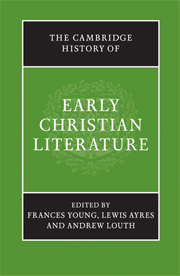Book contents
- Frontmatter
- PART ONE The Beginnings: The New Testament to Irenaeus
- PART TWO THE THIRD CENTURY
- A LITERARY GUIDE
- B CONTEXT AND INTERPRETATION
- 17 Social and historical setting: Christianity as culture critique
- 18 Articulating identity
- 19 Christian teaching
- 20 The significance of third-century Christian literature
- PART THREE FOUNDATION OF A NEW CULTURE: FROM DIOCLETIAN TO CYRIL
- Bibliographies
- Index
- Map: The Roman Empire in the late fourth century AD"
- References
17 - Social and historical setting: Christianity as culture critique
from B - CONTEXT AND INTERPRETATION
Published online by Cambridge University Press: 28 March 2008
- Frontmatter
- PART ONE The Beginnings: The New Testament to Irenaeus
- PART TWO THE THIRD CENTURY
- A LITERARY GUIDE
- B CONTEXT AND INTERPRETATION
- 17 Social and historical setting: Christianity as culture critique
- 18 Articulating identity
- 19 Christian teaching
- 20 The significance of third-century Christian literature
- PART THREE FOUNDATION OF A NEW CULTURE: FROM DIOCLETIAN TO CYRIL
- Bibliographies
- Index
- Map: The Roman Empire in the late fourth century AD"
- References
Summary
The third century is often cast as a period of increasing conformity to Roman institutions and values, one that carried Christianity further and further from its true and original identity. This story of conformity implies an interaction between two disparate cultures in which the weaker culture is modified and somehow diminished through its adaptation. Such a model imagines Christianity as a missionary enterprise seeking to take root in an alien culture. What this narrative obscures is the fact that Christianity was a movement originating within Roman society, invented as it were by ‘Romans’. It is precisely the fact that Christians lacked a unique cultural identity that made the emergence of Christianity such a dilemma for the Empire. Christians did not have a common ethnic identity – that distinctive dye of language, custom, ritual and local history that located other individuals and groups on the cultural map of the Roman Empire. Since the Roman elites were fastidious about their ‘Romanness’, expressed in the values of auctoritas, dignitas, romanitas and mos maiorum, these ethnic identities remained a powerful force in imperial society. When the imperial military and political map bestowed sometimes unwanted regional identities on areas organized into provincial administrative units, the custodians of this regional culture created a hybrid culture by crossing the values and traditions of this ‘Romanness’ with those of the proud, albeit local, elites. Christianity was shaped by the powerful cultural forces at work within the imperial and regional societies where it germinated.
- Type
- Chapter
- Information
- The Cambridge History of Early Christian Literature , pp. 179 - 199Publisher: Cambridge University PressPrint publication year: 2004
References
- 1
- Cited by



